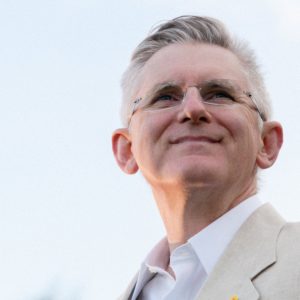 In 2017 Professor Patrick O’Shea became the 15th President of University College Cork, and in 2018 he became Chair of the Irish Universities Association. Sensing renewed optimism and opportunity, he returned to Ireland following a three-decade career in the United States where his most recent leadership appointment was as Vice President and Chief Research Officer of the University of Maryland near Washington DC. At UCC he and his team are committed to an ambitious agenda of excellence as documented in their 2017 Strategic Plan: Independent Thinking, Shared Ambition. He is a firm believer that the modern university must embrace a connected curriculum in which education, creative scholarship, research and impact on society are intimately related.
In 2017 Professor Patrick O’Shea became the 15th President of University College Cork, and in 2018 he became Chair of the Irish Universities Association. Sensing renewed optimism and opportunity, he returned to Ireland following a three-decade career in the United States where his most recent leadership appointment was as Vice President and Chief Research Officer of the University of Maryland near Washington DC. At UCC he and his team are committed to an ambitious agenda of excellence as documented in their 2017 Strategic Plan: Independent Thinking, Shared Ambition. He is a firm believer that the modern university must embrace a connected curriculum in which education, creative scholarship, research and impact on society are intimately related.
Professor O’Shea’s scholarly and research expertise lies in creating light where there is darkness in the spectrum using free electron lasers. For his accomplishments in science, engineering and education, he has been elected to Fellowships in the American Association for the Advancement of Science, American Physical Society, Institute of Electrical and Electronic Engineers, and Irish Academy of Engineering. His interests include history, linguistics, athletics, and cycling.
Can leadership be taught? If so, how?
To become a great leader you need the aptitude and the learning. Becoming a leader is like becoming an explorer, not a tourist. If you find that you thrive on uncertainty, are not afraid of failure, and embrace adversity then you have the aptitude to be a leader. For learning, theory is not good enough. You have to learn in practice on the stormy seas of hard knocks under the tutelage of great mentors. Great mentors help us achieve our potential. I have been fortunate to have great mentors.
What do you think is the difference between management and leadership?
I like to make an analogy with shepherds and sheep dogs. One provides leadership, the other management, and neither is very effective without the other. Great leadership will never substitute for bad management and vice versa. It is rare that great leadership and great management skills reside in the same person. Every great leader needs a great management partner. Throughout my career, I have been fortunate to find such partners, and I am forever in their debt.
The world around us is changing faster than at any time in human history and we need more leaders to emerge. How do we make this happen?
Let’s get back to thinking about explorers and tourists. An explorer has to be capable of adapting to and taking advantage of changing circumstances in tumultuous times. To grow leaders our education system must do more than training tourists in skills. We must educate explorers to observe and question, to discern and reflect, to analyse and act, and to be independent thinkers, competent to navigate and discover in our complex world. At UCC we embrace this approach to education with our connected curriculum.
What is the one mistake you witness leaders making more frequently than others?
Failing to be self-aware and neglecting to get help: trying to do too much; trying to be the shepherd and the sheepdog; in doing the work of three normal people, failing to realise the job calls for six.
What advice would you give to someone dealing with a high-pressure situation in their life or work?
History is the signal we see when we have forgotten the noise of the news. When we focus too much on the noise we fail to notice what is really going on, and therefore act tactically rather than strategically. As leaders, to maintain our strategic focus, we must unplug the noise. As one of my mentors says “When you go home be at home, not at work.”
What are a few resources (books, blogs, podcasts, courses etc) you would recommend to someone looking to gain insight into becoming a better leader?
I have found the best works on leadership (and management) are those on the lives of explorers. There is no better way to learn than from the persistence and determination of Irish explorers:
Leadership lessons from the Shackleton Expedition by Nancy F. Koehn in the New York Times
“An Unsung Hero: Tom Crean – Antarctic Survivor” by Michael Smith
